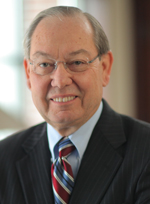 Dr. Jimmy G. Cheek became the seventh chancellor of the University of Tennessee, Knoxville, on Feb. 1, 2009. Through his leadership, the campus is focused on improving the student’s educational experience, enhancing faculty research and scholarship as well as outreach and service. A first-generation college student, Dr. Cheek has set in motion several initiatives to broaden UT Knoxville’s diversity and student access to the university. As the state's flagship research campus, UT Knoxville is currently ranked as a Top 50 public institution. In early 2010, the campus launched its quest to become one of the Top 25 research universities in the nation. It helped solidify strategies for growing the research base and graduate programs, improving graduation rates and attracting and retaining top faculty. Dr. Cheek serves on the board of directors for the Association of Public and Land-grant Universities (APLU), as chairman of the group's Commission on Food, Environment and Renewable Resources ,and as a member of the APLU Presidential Advisory Committee on Energy. He also serves on the UT-Battelle Board of Governors. Dr. Cheek chairs the Board of the International Fertilizer Development Center Advisory Committee, a new global research effort to develop and commercialize clean, environmentally sustainable, cost-effective and renewable fertilizers for the developing world. Prior to his UT appointment, Dr. Cheek was a member of the faculty and an administrator at the University of Florida for 34 years, last serving as senior vice president of agricultural and natural resources. While at Florida, he received the President's Medallion and Student Body Resolution 2009-104 for dedicated and loyal service to the university and outstanding service to students, respectively, and the Morton Wolfson Faculty Award for outstanding contributions to the quality of student life. He was named to the Academy of Teaching Excellence in 2008, a Fellow of the American Association for Agricultural Education in 2005, and a Fellow of the North American Colleges and Teachers of Agriculture in 1998. His research has focused on the influence of experiential learning on student achievement and educational accountability. He has authored more than 80 journal articles and reports and is the senior author of a book. Dr. Cheek earned his bachelor’s degree with high honors and his doctorate from Texas A&M University. He received his master’s degree from Lamar University. Dr. Jimmy G. Cheek became the seventh chancellor of the University of Tennessee, Knoxville, on Feb. 1, 2009. Through his leadership, the campus is focused on improving the student’s educational experience, enhancing faculty research and scholarship as well as outreach and service. A first-generation college student, Dr. Cheek has set in motion several initiatives to broaden UT Knoxville’s diversity and student access to the university. As the state's flagship research campus, UT Knoxville is currently ranked as a Top 50 public institution. In early 2010, the campus launched its quest to become one of the Top 25 research universities in the nation. It helped solidify strategies for growing the research base and graduate programs, improving graduation rates and attracting and retaining top faculty. Dr. Cheek serves on the board of directors for the Association of Public and Land-grant Universities (APLU), as chairman of the group's Commission on Food, Environment and Renewable Resources ,and as a member of the APLU Presidential Advisory Committee on Energy. He also serves on the UT-Battelle Board of Governors. Dr. Cheek chairs the Board of the International Fertilizer Development Center Advisory Committee, a new global research effort to develop and commercialize clean, environmentally sustainable, cost-effective and renewable fertilizers for the developing world. Prior to his UT appointment, Dr. Cheek was a member of the faculty and an administrator at the University of Florida for 34 years, last serving as senior vice president of agricultural and natural resources. While at Florida, he received the President's Medallion and Student Body Resolution 2009-104 for dedicated and loyal service to the university and outstanding service to students, respectively, and the Morton Wolfson Faculty Award for outstanding contributions to the quality of student life. He was named to the Academy of Teaching Excellence in 2008, a Fellow of the American Association for Agricultural Education in 2005, and a Fellow of the North American Colleges and Teachers of Agriculture in 1998. His research has focused on the influence of experiential learning on student achievement and educational accountability. He has authored more than 80 journal articles and reports and is the senior author of a book. Dr. Cheek earned his bachelor’s degree with high honors and his doctorate from Texas A&M University. He received his master’s degree from Lamar University.
Return to Top |
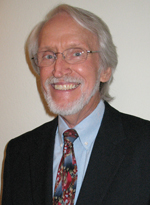 Coy F. Cross II authored the Morrill biography, Justin Smith Morrill: Father of the Land-grant Colleges (Michigan State University Press) after extensive research into Morrill's life, experiences and accomplishments. Dr. Cross, employed as an U.S. Air Force historian from 1988 until 2007, received his PhD in United States Diplomatic History from the University of California, Santa Barbara. He also holds an MA in United States and American Civil War History from California State University, Stanislaus and a BA from Florida State University. Dr. Cross has authored several other books and monographs, including his most recent "Lincoln's Man in Liverpool: Consul Dudley and and the Legal Battle to Stop Confederate Warships," published by Northern Illinois University Press in 2007. Coy F. Cross II authored the Morrill biography, Justin Smith Morrill: Father of the Land-grant Colleges (Michigan State University Press) after extensive research into Morrill's life, experiences and accomplishments. Dr. Cross, employed as an U.S. Air Force historian from 1988 until 2007, received his PhD in United States Diplomatic History from the University of California, Santa Barbara. He also holds an MA in United States and American Civil War History from California State University, Stanislaus and a BA from Florida State University. Dr. Cross has authored several other books and monographs, including his most recent "Lincoln's Man in Liverpool: Consul Dudley and and the Legal Battle to Stop Confederate Warships," published by Northern Illinois University Press in 2007.
Return to Top |
 Michael M. Crow became the sixteenth president of Arizona State University on July 1, 2002. He is guiding the transformation of ASU into one of the nation’s leading public metropolitan research universities, an institution that combines the highest levels of academic excellence, inclusiveness to a broad demographic, and maximum societal impact—a model he terms the “New American University.” Under his leadership ASU has established major interdisciplinary research initiatives such as the Biodesign Institute, Global Institute of Sustainability (GIOS), and more than a dozen new transdisciplinary schools, and witnessed an unprecedented academic infrastructure expansion, near tripling of research expenditures, and attainment of record levels of diversity in the student body. He was previously executive vice provost of Columbia University, where he served as chief strategist of Columbia’s research enterprise and technology transfer operations. A fellow of the National Academy of Public Administration, and member of the Council on Foreign Relations and U.S. Department of Commerce National Advisory Council on Innovation and Entrepreneurship, he is the author of books and articles analyzing science and technology policy and the design of knowledge enterprises. Crow received his Ph.D. in Public Administration (Science and Technology Policy) from the Maxwell School of Citizenship and Public Affairs, Syracuse University, in 1985. Michael M. Crow became the sixteenth president of Arizona State University on July 1, 2002. He is guiding the transformation of ASU into one of the nation’s leading public metropolitan research universities, an institution that combines the highest levels of academic excellence, inclusiveness to a broad demographic, and maximum societal impact—a model he terms the “New American University.” Under his leadership ASU has established major interdisciplinary research initiatives such as the Biodesign Institute, Global Institute of Sustainability (GIOS), and more than a dozen new transdisciplinary schools, and witnessed an unprecedented academic infrastructure expansion, near tripling of research expenditures, and attainment of record levels of diversity in the student body. He was previously executive vice provost of Columbia University, where he served as chief strategist of Columbia’s research enterprise and technology transfer operations. A fellow of the National Academy of Public Administration, and member of the Council on Foreign Relations and U.S. Department of Commerce National Advisory Council on Innovation and Entrepreneurship, he is the author of books and articles analyzing science and technology policy and the design of knowledge enterprises. Crow received his Ph.D. in Public Administration (Science and Technology Policy) from the Maxwell School of Citizenship and Public Affairs, Syracuse University, in 1985.
Return to Top |
 William B. Dabars is Research Fellow for University Design in the Office of the President, Arizona State University. He has served in various research capacities for the University of Southern California, University of California, Santa Barbara, and Getty Research Institute, where he participated in editorial projects focused on aesthetic and architectural theory. He has also served as an editorial consultant for the Getty Conservation Institute and University of Colorado, Boulder. He received a Ph.D. in History from the University of California, Los Angeles. His dissertation, current research, and forthcoming publications focus on the American research university. William B. Dabars is Research Fellow for University Design in the Office of the President, Arizona State University. He has served in various research capacities for the University of Southern California, University of California, Santa Barbara, and Getty Research Institute, where he participated in editorial projects focused on aesthetic and architectural theory. He has also served as an editorial consultant for the Getty Conservation Institute and University of Colorado, Boulder. He received a Ph.D. in History from the University of California, Los Angeles. His dissertation, current research, and forthcoming publications focus on the American research university.
Return to Top |
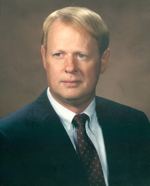 James J. Duderstadt is President Emeritus and University Professor of Science and Engineering at the University of Michigan. A graduate of Yale and Caltech, Dr. Duderstadt’s teaching and research areas include nuclear science, applied physics, cyberinfrastructure, and science and education policy. He has served as chair of numerous National Academy and federal commissions, including the National Science Board and the Policy and Global Affairs Division of the National Research Council. At Michigan he currently directs the Science, Technology, and Public Policy program and the Millennium Project, a research center concerned with the impact of advanced technologies on society. James J. Duderstadt is President Emeritus and University Professor of Science and Engineering at the University of Michigan. A graduate of Yale and Caltech, Dr. Duderstadt’s teaching and research areas include nuclear science, applied physics, cyberinfrastructure, and science and education policy. He has served as chair of numerous National Academy and federal commissions, including the National Science Board and the Policy and Global Affairs Division of the National Research Council. At Michigan he currently directs the Science, Technology, and Public Policy program and the Millennium Project, a research center concerned with the impact of advanced technologies on society.
Return to Top |
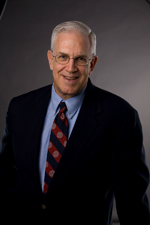 Ronald G. Ehrenberg is the Irving M. Ives Professor of Industrial and Labor Relations and Economics at Cornell University and a Stephen H. Weiss Presidential Fellow. He also is Director of the Cornell Higher Education Research Institute. From July 1, 1995 to June 30, 1998 he served as Cornell’s Vice President for Academic Programs, Planning and Budgeting. Ehrenberg served as a member of the Cornell Board of Trustees from July 1, 2006 to June 30, 2010 and currently serves on the SUNY Board of Trustees. He received a B.A. in mathematics from Harpur College (SUNY Binghamton) in 1966, M.A. and Ph.D. in economics from Northwestern University in 1970. He is a research associate at the National Bureau of Economic Research, a research fellow at IZA (Berlin), was a member of the Executive Committee of the American Economic Association, chaired the AAUP Committees on Retirement and the Economic Status of the Profession, and is Past President of the Society of Labor Economists. He also chaired the National Research Council's Board of Higher Education and served on its committee on Gender Differences in the Careers of Science, Engineering and Mathematics Faculty, the NACUBO Endowment Advisory Panel and The College Board’s Rethinking Student aid Study Group. Currently, Ehrenberg is a member of the Board of Trustees of Emeriti Retirement Health Solutions, and a member of the National Research Council Committees on Measuring Higher Education Productivity and Research Universities. Ehrenberg was the founding editor of Research in Labor Economics, and served a ten-year term as co-editor of the Journal of Human Resources. A member of the Cornell faculty for 35 years, he has authored or co-authored over 150 papers and authored or edited 26 books, including the leading textbook, Modern Labor Economics: Theory and Public Policy. His recent research has focused on higher education issues. He is the editor of American University: National Treasure or Endangered Species (Cornell University Press, 1997) and the author of Tuition Rising: Why College Costs So Much (Harvard University Press, 2002). He is the editor of Governing Academia (Cornell University Press, 2004), and What’s Happening to Public Higher Education? (Johns Hopkins University Press, 2007), and coeditor of Science and the University (University of Wisconsin Press, 2007) and Doctoral Education and the Faculty of the Future (Cornell University Press, 2008). Ehrenberg is a coauthor of Educating Scholars: Doctoral Education in the Humanities (Princeton University Press, 2010). Ronald G. Ehrenberg is the Irving M. Ives Professor of Industrial and Labor Relations and Economics at Cornell University and a Stephen H. Weiss Presidential Fellow. He also is Director of the Cornell Higher Education Research Institute. From July 1, 1995 to June 30, 1998 he served as Cornell’s Vice President for Academic Programs, Planning and Budgeting. Ehrenberg served as a member of the Cornell Board of Trustees from July 1, 2006 to June 30, 2010 and currently serves on the SUNY Board of Trustees. He received a B.A. in mathematics from Harpur College (SUNY Binghamton) in 1966, M.A. and Ph.D. in economics from Northwestern University in 1970. He is a research associate at the National Bureau of Economic Research, a research fellow at IZA (Berlin), was a member of the Executive Committee of the American Economic Association, chaired the AAUP Committees on Retirement and the Economic Status of the Profession, and is Past President of the Society of Labor Economists. He also chaired the National Research Council's Board of Higher Education and served on its committee on Gender Differences in the Careers of Science, Engineering and Mathematics Faculty, the NACUBO Endowment Advisory Panel and The College Board’s Rethinking Student aid Study Group. Currently, Ehrenberg is a member of the Board of Trustees of Emeriti Retirement Health Solutions, and a member of the National Research Council Committees on Measuring Higher Education Productivity and Research Universities. Ehrenberg was the founding editor of Research in Labor Economics, and served a ten-year term as co-editor of the Journal of Human Resources. A member of the Cornell faculty for 35 years, he has authored or co-authored over 150 papers and authored or edited 26 books, including the leading textbook, Modern Labor Economics: Theory and Public Policy. His recent research has focused on higher education issues. He is the editor of American University: National Treasure or Endangered Species (Cornell University Press, 1997) and the author of Tuition Rising: Why College Costs So Much (Harvard University Press, 2002). He is the editor of Governing Academia (Cornell University Press, 2004), and What’s Happening to Public Higher Education? (Johns Hopkins University Press, 2007), and coeditor of Science and the University (University of Wisconsin Press, 2007) and Doctoral Education and the Faculty of the Future (Cornell University Press, 2008). Ehrenberg is a coauthor of Educating Scholars: Doctoral Education in the Humanities (Princeton University Press, 2010).
Return to Top |
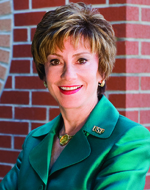 Judy Genshaft was appointed president of the University of South Florida System in July 2000. With campuses in Tampa, St. Petersburg, Sarasota-Manatee and Lakeland, the USF System serves more than 47,000 students in more than 232 degree programs on the undergraduate, master's, specialist and doctoral levels, including the doctor of medicine. Today the university has an annual budget of more than $1.6 billion. Under President Genshaft's leadership, USF has grown to be the 9th largest public research university in the nation and one of 63 public research universities named to the top tier (very high research activity) of the Carnegie Foundation for the Advancement of Teaching. USF provides more than $3.7 billion annual economic impact on the Tampa Bay regional economy and is one of the top employers in the Tampa Bay region. President Genshaft has established herself as a leader for economic development, especially related to high-technology and bioscience. She has focused on partnering university research -- which under her leadership is more than $390 million -- with corporate and entrepreneurial partners. Nationally, she chairs the NCAA Board of Directors and is a past chair of the American Council on Education. She serves on the executive committee of the board of the Association of Public Land-grant Universities. Prior to joining USF, President Genshaft served as provost and vice president for academic affairs at the University at Albany, State University of New York. She also held various positions during a sixteen-year tenure at The Ohio State University. She holds a bachelor's degree in social work and psychology from the University of Wisconsin at Madison, a master's degree in school counseling from Kent State University, and a doctorate in counseling psychology from Kent State. She has authored and co-authored 69 journal articles and three books. Judy Genshaft was appointed president of the University of South Florida System in July 2000. With campuses in Tampa, St. Petersburg, Sarasota-Manatee and Lakeland, the USF System serves more than 47,000 students in more than 232 degree programs on the undergraduate, master's, specialist and doctoral levels, including the doctor of medicine. Today the university has an annual budget of more than $1.6 billion. Under President Genshaft's leadership, USF has grown to be the 9th largest public research university in the nation and one of 63 public research universities named to the top tier (very high research activity) of the Carnegie Foundation for the Advancement of Teaching. USF provides more than $3.7 billion annual economic impact on the Tampa Bay regional economy and is one of the top employers in the Tampa Bay region. President Genshaft has established herself as a leader for economic development, especially related to high-technology and bioscience. She has focused on partnering university research -- which under her leadership is more than $390 million -- with corporate and entrepreneurial partners. Nationally, she chairs the NCAA Board of Directors and is a past chair of the American Council on Education. She serves on the executive committee of the board of the Association of Public Land-grant Universities. Prior to joining USF, President Genshaft served as provost and vice president for academic affairs at the University at Albany, State University of New York. She also held various positions during a sixteen-year tenure at The Ohio State University. She holds a bachelor's degree in social work and psychology from the University of Wisconsin at Madison, a master's degree in school counseling from Kent State University, and a doctorate in counseling psychology from Kent State. She has authored and co-authored 69 journal articles and three books.
Return to Top |
 Domenico Grasso is the Vice President for Research and Dean of the Graduate College at the University of Vermont (UVM). Prior to holding this position, he was the Dean of the College of Engineering and Mathematical Sciences (CEMS) at UVM. Prior to joining UVM, Professor Grasso was Rosemary Bradford Hewlett Professor and Founding Director of the Picker Engineering Program at Smith College, the first engineering program at a women's college in the United States, and Professor and Head of Department in Civil & Environmental Engineering at the University of Connecticut. He has been a Vice Chair, EPA Science Advisory Board, Visiting Scholar at UC-Berkeley, a NATO Fellow, and an Invited Technical Expert to the United Nations Industrial Development Organization in Vienna, Austria.He holds a B.Sc. from Worcester Polytechnic Institute, an M.S. from Purdue University and a Ph.D. from The University of Michigan. He is a registered Professional Engineer in the states of Connecticut and Texas, and a Diplomate of the American Academy of Environmental Engineers. Domenico Grasso is the Vice President for Research and Dean of the Graduate College at the University of Vermont (UVM). Prior to holding this position, he was the Dean of the College of Engineering and Mathematical Sciences (CEMS) at UVM. Prior to joining UVM, Professor Grasso was Rosemary Bradford Hewlett Professor and Founding Director of the Picker Engineering Program at Smith College, the first engineering program at a women's college in the United States, and Professor and Head of Department in Civil & Environmental Engineering at the University of Connecticut. He has been a Vice Chair, EPA Science Advisory Board, Visiting Scholar at UC-Berkeley, a NATO Fellow, and an Invited Technical Expert to the United Nations Industrial Development Organization in Vienna, Austria.He holds a B.Sc. from Worcester Polytechnic Institute, an M.S. from Purdue University and a Ph.D. from The University of Michigan. He is a registered Professional Engineer in the states of Connecticut and Texas, and a Diplomate of the American Academy of Environmental Engineers.
Return to Top |
 Martha Heath is chair of the Appropriations Committee of the Vermont House of Representatives, where she has served since 1993. A native of Newport, Vermont, where she attended public schools, Representative Heath earned her B.S. degree at the University of Vermont in 1969. She served on the University of Vermont Board of Trustees for twelve years, from 1997 to 2009, including service as chair of the Educational Policy and Institutional Resources Committee and as Vice Chair of the Board. She has served, in addition, on many other boards: current service includes the Westford School Board; the Chittenden Central Supervisory Union School Board; the Board of Trustees of the Vermont Student Assistance Corporation; the Board of the Governor's Institutes of Vermont; and the Board of Trustees of Camp Thorpe. She is Democrat and resides in Westford, Vermont. Martha Heath is chair of the Appropriations Committee of the Vermont House of Representatives, where she has served since 1993. A native of Newport, Vermont, where she attended public schools, Representative Heath earned her B.S. degree at the University of Vermont in 1969. She served on the University of Vermont Board of Trustees for twelve years, from 1997 to 2009, including service as chair of the Educational Policy and Institutional Resources Committee and as Vice Chair of the Board. She has served, in addition, on many other boards: current service includes the Westford School Board; the Chittenden Central Supervisory Union School Board; the Board of Trustees of the Vermont Student Assistance Corporation; the Board of the Governor's Institutes of Vermont; and the Board of Trustees of Camp Thorpe. She is Democrat and resides in Westford, Vermont.
Return to Top |
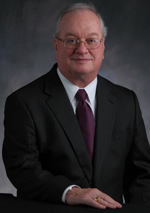 John Hudzik is Professor at Michigan State University and NAFSA Senior Scholar for Internationalization. He is past President and Chair of the Board of Directors of NAFSA, Association of International Educators, and past President of the Association of International Education Administrators (AIEA). From 1995 to 2010, he was Dean of International Studies and Programs at Michigan State University and then Vice President for Global Engagement and Strategic Projects. He was Acting University Provost and Vice President of Academic Affairs at MSU in 2005. He has served on numerous international policy and advisory boards for international development, regional studies, higher education internationalization, and education abroad; he is a frequently invited commentator and speaker at national and international conferences on the direction of global higher education and internationalization, and publishes frequently on these topics. He is an internationally recognized scholar and consultant on judicial reform and judicial administration and Professor of Criminal Justice. He is the author of numerous books, monographs and articles on both international education and judicial administration and a member of the Academy of Criminal Justice Sciences and the National Association of State Judicial Educators, NAFSA, AIEA, EAIE and APAIE. He is recipient of several national awards for his scholarly work in judicial systems and in international education. John Hudzik is Professor at Michigan State University and NAFSA Senior Scholar for Internationalization. He is past President and Chair of the Board of Directors of NAFSA, Association of International Educators, and past President of the Association of International Education Administrators (AIEA). From 1995 to 2010, he was Dean of International Studies and Programs at Michigan State University and then Vice President for Global Engagement and Strategic Projects. He was Acting University Provost and Vice President of Academic Affairs at MSU in 2005. He has served on numerous international policy and advisory boards for international development, regional studies, higher education internationalization, and education abroad; he is a frequently invited commentator and speaker at national and international conferences on the direction of global higher education and internationalization, and publishes frequently on these topics. He is an internationally recognized scholar and consultant on judicial reform and judicial administration and Professor of Criminal Justice. He is the author of numerous books, monographs and articles on both international education and judicial administration and a member of the Academy of Criminal Justice Sciences and the National Association of State Judicial Educators, NAFSA, AIEA, EAIE and APAIE. He is recipient of several national awards for his scholarly work in judicial systems and in international education.
Return to Top |
 Jane E. Knodell was appointed Provost and Senior Vice President of the University of Vermont on December 13, 2010. Professor Knodell served as Interim Provost and Senior Vice President beginning July 1, 2009. She has been a member of the faculty of the University of Vermont since 1986, and has served the University in a variety of administrative roles, including Chair of the Department of Economics, Interim Dean and Associate Dean of the College of Arts and Sciences, and Associate Provost for Budget and Capital Planning. Knodell earned her bachelor's degree with honors and distinction in 1976 from Stanford University, and her Ph.D. in Economics, also from Stanford, in 1984. Her work on the monetary history of the U.S. is wide-ranging, exploring stabilization and integration by the Second Bank of the United States in the 1820s, the evolution of open market operations by the Federal Reserve Bank in the 1920s, and the causes and effects of the financial deregulation of the late twentieth century. Knodell's work on the nature and role of early central banking institutions has been published in leading economic and financial history journals. Knodell is an active member of the Burlington community, having served on the City Council from 1993-1997, and again from 1999-2009. She was elected President of the City Council in 1999 and 2000. She has also served on a variety of Vermont non-profits and municipal boards seeking to advance economic development through enhanced access to capital. Jane E. Knodell was appointed Provost and Senior Vice President of the University of Vermont on December 13, 2010. Professor Knodell served as Interim Provost and Senior Vice President beginning July 1, 2009. She has been a member of the faculty of the University of Vermont since 1986, and has served the University in a variety of administrative roles, including Chair of the Department of Economics, Interim Dean and Associate Dean of the College of Arts and Sciences, and Associate Provost for Budget and Capital Planning. Knodell earned her bachelor's degree with honors and distinction in 1976 from Stanford University, and her Ph.D. in Economics, also from Stanford, in 1984. Her work on the monetary history of the U.S. is wide-ranging, exploring stabilization and integration by the Second Bank of the United States in the 1820s, the evolution of open market operations by the Federal Reserve Bank in the 1920s, and the causes and effects of the financial deregulation of the late twentieth century. Knodell's work on the nature and role of early central banking institutions has been published in leading economic and financial history journals. Knodell is an active member of the Burlington community, having served on the City Council from 1993-1997, and again from 1999-2009. She was elected President of the City Council in 1999 and 2000. She has also served on a variety of Vermont non-profits and municipal boards seeking to advance economic development through enhanced access to capital.
Return to Top |
 Douglas O. Lantagne is the Dean and Director of Extension at the University of Vermont. He spent 14 years at Michigan State University in an Extension/research position before moving to UVM. Dr. Lantagne has held several positions with University of Vermont Extension, including northwest regional chair, associate director, interim director and now dean and director. During that same time, he chaired the New England Extension Director's association and the Northeast Association of Extension Directors, completed a four-year term as a member of Extension Committee on Organization and Policy (ECOP), chaired the search committee chair for the new ECOP national executive director, and served on various other national committees and task forces. He has recently rejoined ECOP as a representative from the Northeast Region and is current past chair of ECOP. Dr. Lantagne is also a fellow from the first class of the Food System Leadership Institute (FSLI). Under his leadership, UVM Extension is a strong proponent of the food systems transdisciplinary research, education and outreach Spire of Excellence recently embraced by the faculty and leadership at the University of Vermont. Douglas O. Lantagne is the Dean and Director of Extension at the University of Vermont. He spent 14 years at Michigan State University in an Extension/research position before moving to UVM. Dr. Lantagne has held several positions with University of Vermont Extension, including northwest regional chair, associate director, interim director and now dean and director. During that same time, he chaired the New England Extension Director's association and the Northeast Association of Extension Directors, completed a four-year term as a member of Extension Committee on Organization and Policy (ECOP), chaired the search committee chair for the new ECOP national executive director, and served on various other national committees and task forces. He has recently rejoined ECOP as a representative from the Northeast Region and is current past chair of ECOP. Dr. Lantagne is also a fellow from the first class of the Food System Leadership Institute (FSLI). Under his leadership, UVM Extension is a strong proponent of the food systems transdisciplinary research, education and outreach Spire of Excellence recently embraced by the faculty and leadership at the University of Vermont.
Return to Top |
 Fayneese Miller is dean of the College of Education and Social Services and professor of Human Development, Educational Leadership and Social Policy at the University of Vermont. Prior to her appointment as dean at UVM, she was associate professor of education and human development and a past director of the Center for the Study of Race & Ethnicity in America at Brown University. Dr. Miller developed and chaired the first Ethnic Studies Program at Brown University. Dr. Miller is a social psychologist and specializes in the psychosocial development of youth, with special emphasis on such topics as alienation, social identity, and cross-racial friendships. She has conducted research on black males that was funded by the Eli Lily Foundation. Her work includes a study on perceptions of racial/ethnic bias for the Rhode Island Supreme Court and a project on school-based truancy courts for the Rhode Island Family Court. Dr. Miller serves on the U.S. Department of Justice's National Truancy Prevention Association (NTPA) Board. In collaboration with NTPA, she completed a benchbook on truancy for family court judges. Dr. Miller was a visiting professor at the University of Cape Town in South Africa, a National Science Foundation Fellow, and Salzburg Fellow. She was a member of the American Academy of Arts and Science Task Force on diversity in higher education and the Annie Casey Foundation and Joint Center for Political Studies focus group on reproductive health. She was a member of the American Council of Education (ACE) 2004-2005 Fellow's class—a Washington-based fellowship program that prepares future senior executives in higher education. She was also a Millennium Leadership Fellow (MLI). Dr. Miller recently completed a book entitled Transforming Learning Environments: Strategies for the Next Generation to be published in November 20112 by Emerald Publishing Group. A second book with Emerald, focused on adolescent social behavior and co-authored with Dr. George Leibowitz, will be published in the fall of 2013. Dr. Miller is the chair-elect of the board for the American Association for College's of Education (AACTE), president-elect for the Council of Academic Dean's from Research Education Institutions (CADREI), Vermont's higher education lead for Smarter Balance, and a past member and chairman of the Vermont State Board of Education. Fayneese Miller is dean of the College of Education and Social Services and professor of Human Development, Educational Leadership and Social Policy at the University of Vermont. Prior to her appointment as dean at UVM, she was associate professor of education and human development and a past director of the Center for the Study of Race & Ethnicity in America at Brown University. Dr. Miller developed and chaired the first Ethnic Studies Program at Brown University. Dr. Miller is a social psychologist and specializes in the psychosocial development of youth, with special emphasis on such topics as alienation, social identity, and cross-racial friendships. She has conducted research on black males that was funded by the Eli Lily Foundation. Her work includes a study on perceptions of racial/ethnic bias for the Rhode Island Supreme Court and a project on school-based truancy courts for the Rhode Island Family Court. Dr. Miller serves on the U.S. Department of Justice's National Truancy Prevention Association (NTPA) Board. In collaboration with NTPA, she completed a benchbook on truancy for family court judges. Dr. Miller was a visiting professor at the University of Cape Town in South Africa, a National Science Foundation Fellow, and Salzburg Fellow. She was a member of the American Academy of Arts and Science Task Force on diversity in higher education and the Annie Casey Foundation and Joint Center for Political Studies focus group on reproductive health. She was a member of the American Council of Education (ACE) 2004-2005 Fellow's class—a Washington-based fellowship program that prepares future senior executives in higher education. She was also a Millennium Leadership Fellow (MLI). Dr. Miller recently completed a book entitled Transforming Learning Environments: Strategies for the Next Generation to be published in November 20112 by Emerald Publishing Group. A second book with Emerald, focused on adolescent social behavior and co-authored with Dr. George Leibowitz, will be published in the fall of 2013. Dr. Miller is the chair-elect of the board for the American Association for College's of Education (AACTE), president-elect for the Council of Academic Dean's from Research Education Institutions (CADREI), Vermont's higher education lead for Smarter Balance, and a past member and chairman of the Vermont State Board of Education.
Return to Top |
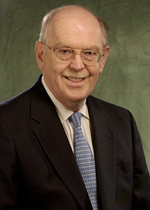 M. Peter McPherson has been president of the Association of Public and Land Grant Universities since 2004. Before joining A۰P۰L۰U, he was president for more than eleven years (1993-2004) of Michigan State University. He has also served as Deputy Secretary of the United States Treasury, as Administrator of the U. S. Agency for International Development, as Director of Economic Policy for the Coalition Provisional Authority of Iraq. He is the former chair of the Board of Directors of Dow Jones and Company and the founding co-chair of the Partnership to Cut Hunger and Poverty in Africa. A Special Assistant in the White House to President Gerald Ford, he also has been a partner—and head of the Washington office—of the Ohio law firm Vorys, Sater, Seymour, and Pease. He has received numerous awards (from the Departments of State and Treasury, UNICEF, and the Jewish National Fund, among others). He received a B.A. from Michigan State University, an M.B.A. from Western Michigan University, and a J.D. from American University. M. Peter McPherson has been president of the Association of Public and Land Grant Universities since 2004. Before joining A۰P۰L۰U, he was president for more than eleven years (1993-2004) of Michigan State University. He has also served as Deputy Secretary of the United States Treasury, as Administrator of the U. S. Agency for International Development, as Director of Economic Policy for the Coalition Provisional Authority of Iraq. He is the former chair of the Board of Directors of Dow Jones and Company and the founding co-chair of the Partnership to Cut Hunger and Poverty in Africa. A Special Assistant in the White House to President Gerald Ford, he also has been a partner—and head of the Washington office—of the Ohio law firm Vorys, Sater, Seymour, and Pease. He has received numerous awards (from the Departments of State and Treasury, UNICEF, and the Jewish National Fund, among others). He received a B.A. from Michigan State University, an M.B.A. from Western Michigan University, and a J.D. from American University.
Return to Top |
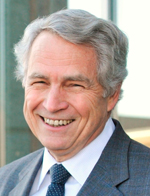 David Shulenburger, A۰P۰L۰U Senior Fellow, was A۰P۰L۰U’s first Vice President for Academic Affairs. He served as Provost and Executive Vice Chancellor of the University of Kansas from 1993 to 2006. He was chair of the Board of Directors of the Center for Research Libraries, a member of the National Commission on Writing, and a BioOne board member. He currently serves as a Consulting Editor for Change Magazine. Shulenburger writes and speaks nationally and internationally on the economics of higher education and scholarly communications and accountability in higher education. He holds a Ph.D. from the University of Illinois. David Shulenburger, A۰P۰L۰U Senior Fellow, was A۰P۰L۰U’s first Vice President for Academic Affairs. He served as Provost and Executive Vice Chancellor of the University of Kansas from 1993 to 2006. He was chair of the Board of Directors of the Center for Research Libraries, a member of the National Commission on Writing, and a BioOne board member. He currently serves as a Consulting Editor for Change Magazine. Shulenburger writes and speaks nationally and internationally on the economics of higher education and scholarly communications and accountability in higher education. He holds a Ph.D. from the University of Illinois.
Return to Top |
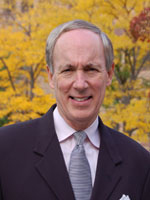 Tom Sullivan, with his appointment effective July 15, 2012, became the 26th President of the University of Vermont. Previously, he had served as Senior Vice President for Academic Affairs and Provost at the University of Minnesota from July 2004 through January 2012. He also served as the eighth dean of the University of Minnesota Law School from 1995 to 2002. Upon finishing his term as dean, he returned to full-time research and teaching. In June of 2003, he received the J. William Elwin, Jr., Award from the American Bar Association Section of Legal Education for leadership and contributions to law school development. At the University of Minnesota Law School, he has received the Stanley V. Kinyon Teacher of the Year Award for Excellence in Teaching. In 2005, he was appointed the Julius E. Davis Chair in Law. He has chaired the ABA Section of Legal Education, and has chaired the Association of American Law Schools Section on Antitrust and Economic Regulation. On several occasions, he has been a consultant to the U.S. Senate Judiciary Committee on judicial nominations to the Supreme Court, and to the U.S. Senate Commerce Committee on mergers. He is a nationally recognized authority on antitrust law and complex litigation, having authored ten books and over 50 articles. He and co-author Professor Richard Frase published Proportionality Principles in American Law: Controlling Excessive Government Actions (Oxford University Press, 2009). He is the co-author, with Professors Herbert Hovencamp and Howard Shelanksi of Antitrust Law, Policy, and Procedure (6th ed., 2009) and co-author with Professor Jeffrey Harrison of Understanding Antitrust and Its Economic Implications (5th ed., 2009). Most recently, he published Complex Litigation with Professors Richard Freer, Doug Floyd and Brad Clary (2010). He also published Private Antitrust Actions (Little, Brown & Co., 1996) with Douglas Floyd. He is presently writing a book entitled The Arc of Due Process in American Constitutional Law. Tom Sullivan, with his appointment effective July 15, 2012, became the 26th President of the University of Vermont. Previously, he had served as Senior Vice President for Academic Affairs and Provost at the University of Minnesota from July 2004 through January 2012. He also served as the eighth dean of the University of Minnesota Law School from 1995 to 2002. Upon finishing his term as dean, he returned to full-time research and teaching. In June of 2003, he received the J. William Elwin, Jr., Award from the American Bar Association Section of Legal Education for leadership and contributions to law school development. At the University of Minnesota Law School, he has received the Stanley V. Kinyon Teacher of the Year Award for Excellence in Teaching. In 2005, he was appointed the Julius E. Davis Chair in Law. He has chaired the ABA Section of Legal Education, and has chaired the Association of American Law Schools Section on Antitrust and Economic Regulation. On several occasions, he has been a consultant to the U.S. Senate Judiciary Committee on judicial nominations to the Supreme Court, and to the U.S. Senate Commerce Committee on mergers. He is a nationally recognized authority on antitrust law and complex litigation, having authored ten books and over 50 articles. He and co-author Professor Richard Frase published Proportionality Principles in American Law: Controlling Excessive Government Actions (Oxford University Press, 2009). He is the co-author, with Professors Herbert Hovencamp and Howard Shelanksi of Antitrust Law, Policy, and Procedure (6th ed., 2009) and co-author with Professor Jeffrey Harrison of Understanding Antitrust and Its Economic Implications (5th ed., 2009). Most recently, he published Complex Litigation with Professors Richard Freer, Doug Floyd and Brad Clary (2010). He also published Private Antitrust Actions (Little, Brown & Co., 1996) with Douglas Floyd. He is presently writing a book entitled The Arc of Due Process in American Constitutional Law.
Return to Top |
 Thomas C. Vogelmann became Dean of the College of Agriculture and Life Sciences and Director of the Vermont Agricultural Experiment Station at the University of Vermont (UVM) in 2009, after holding positions of Interim Dean from July 2008, and Professor and Chair of the Department of Plant Biology from 2002. A graduate of Syracuse University (Ph.D.), Washington State University (M.S.) and the University of Vermont (B.S.), Dr. Vogelmann worked for eighteen years at the University of Wyoming, where he attained the rank of Professor of Botany and served as the Interim Chair of the Department of Botany. He also served as Visiting Professor at the University of Lund in Lund, Sweden, and Visiting Research Fellow at the Australian National University in Canberra, Australia. Dr. Vogelmann has received numerous awards and other recognitions for his teaching, research, and service, including the Robertson Lecture for Outstanding Contributions to Plant Physiology conferred by the Australian and New Zealand Societies for Plant Physiology. He also received the Presidential Award for Outstanding Research, the College of Arts and Sciences Award for Outstanding Research, and the Elbogen Award for Outstanding Teaching, all at the University of Wyoming. Most recently, he received the Joseph E. Carrigan Award for Excellence in Teaching and Undergraduate Education in the College of Agriculture and Life Sciences at UVM. Dr. Vogelmann specializes in plant physiology and has published more than eighty scientific papers in refereed journals, books, and technical proceedings. Thomas C. Vogelmann became Dean of the College of Agriculture and Life Sciences and Director of the Vermont Agricultural Experiment Station at the University of Vermont (UVM) in 2009, after holding positions of Interim Dean from July 2008, and Professor and Chair of the Department of Plant Biology from 2002. A graduate of Syracuse University (Ph.D.), Washington State University (M.S.) and the University of Vermont (B.S.), Dr. Vogelmann worked for eighteen years at the University of Wyoming, where he attained the rank of Professor of Botany and served as the Interim Chair of the Department of Botany. He also served as Visiting Professor at the University of Lund in Lund, Sweden, and Visiting Research Fellow at the Australian National University in Canberra, Australia. Dr. Vogelmann has received numerous awards and other recognitions for his teaching, research, and service, including the Robertson Lecture for Outstanding Contributions to Plant Physiology conferred by the Australian and New Zealand Societies for Plant Physiology. He also received the Presidential Award for Outstanding Research, the College of Arts and Sciences Award for Outstanding Research, and the Elbogen Award for Outstanding Teaching, all at the University of Wyoming. Most recently, he received the Joseph E. Carrigan Award for Excellence in Teaching and Undergraduate Education in the College of Agriculture and Life Sciences at UVM. Dr. Vogelmann specializes in plant physiology and has published more than eighty scientific papers in refereed journals, books, and technical proceedings.
Return to Top |
Jane Wellman is executive director of the National Association of System Heads. In 2007 she founded the Delta Project on Postsecondary Education Costs, Productivity and Accountability, a non-profit research and policy organization now housed within the American Institutes for Research. Its mission is to make college more affordable by controlling costs — without sacrificing access or educational quality — through better use of data to inform strategic decision-making. The organization’s most recent report, Trends in College Spending 1999-2009: Where Does the Money Come From? Where Does It Go? What Does It Buy? examines college spending and revenue trends nationwide in the years leading up to and into the current recession. Wellman has more than 30 years of experience in higher education policy in the United States, at both state and federal levels, working with public, non-profit and for-profit institutions. Her particular expertise is in state fiscal policy, cost analysis, strategic planning, state and federal regulation of higher education, accountability metrics and performance reporting, and quality control including accreditation. She serves on the Board of Directors for the Association of American Colleges and Universities. In addition to research and writing, she consults with national and international organizations including the National Center for Public Policy and Higher Education, the State Higher Education Executive Officers, the Association of Governing Boards, the American Council on Education, the National Governors Association, the U.S. Secretary of Education and the Organization for Economic Cooperation and Development.
Return to Top |
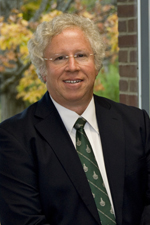 Dave Wolk came to the presidency of Castleton State College in December 2001 after intertwined careers in education and government. He has been a guidance counselor and teacher at Mount St Joseph Academy, Principal of Barstow Memorial School in Chittenden, Principal of Rutland High School, Superintendent of Schools in Rutland City, and Vermont's Commissioner of Education. He was a Vermont state senator and Governor Howard Dean's Chief of Policy. He has served on and/or led over forty public policy boards and commissions. At Castleton he has overseen expansion of academic programs, the arts, athletics, and co-curricular activities, as well as an increased involvement by the college in the local community and an expanded commitment to civic engagement and service-learning. New construction has included five new residence halls, fitness centers, Campus Center, Spartan Stadium, radio station, television studio, Spartan Athletic Complex, Communication Department, an enlarged and renovated science center and renovated fine arts center, and renovation and expansion of the new Spartan Arena in Rutland. President Wolk was born and grew up in Rutland. He graduated from Rutland High School and then Middlebury College with a degree in political science. He earned a master's degree in educational administration and planning at UVM and a certificate of advanced graduate study at Harvard University. His many honors include a 2012 Honorary Doctor of Letters degree from Middlebury College, the 2009 Award for Lifetime Achievement from the New England Board of Higher Education, the 2008 Business Person of the Year from the Rutland Region Chamber of Commerce, the 2006 Distinguished American Award, the 2004 Distinguished Citizen of the Year Award, and various leadership and community service awards as a legislator and educator. Dave Wolk came to the presidency of Castleton State College in December 2001 after intertwined careers in education and government. He has been a guidance counselor and teacher at Mount St Joseph Academy, Principal of Barstow Memorial School in Chittenden, Principal of Rutland High School, Superintendent of Schools in Rutland City, and Vermont's Commissioner of Education. He was a Vermont state senator and Governor Howard Dean's Chief of Policy. He has served on and/or led over forty public policy boards and commissions. At Castleton he has overseen expansion of academic programs, the arts, athletics, and co-curricular activities, as well as an increased involvement by the college in the local community and an expanded commitment to civic engagement and service-learning. New construction has included five new residence halls, fitness centers, Campus Center, Spartan Stadium, radio station, television studio, Spartan Athletic Complex, Communication Department, an enlarged and renovated science center and renovated fine arts center, and renovation and expansion of the new Spartan Arena in Rutland. President Wolk was born and grew up in Rutland. He graduated from Rutland High School and then Middlebury College with a degree in political science. He earned a master's degree in educational administration and planning at UVM and a certificate of advanced graduate study at Harvard University. His many honors include a 2012 Honorary Doctor of Letters degree from Middlebury College, the 2009 Award for Lifetime Achievement from the New England Board of Higher Education, the 2008 Business Person of the Year from the Rutland Region Chamber of Commerce, the 2006 Distinguished American Award, the 2004 Distinguished Citizen of the Year Award, and various leadership and community service awards as a legislator and educator.
Return to Top |
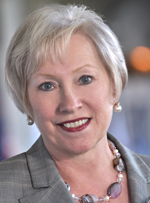 Nancy L. Zimpher became the 12th Chancellor of the State University of New York in June 2009. A nationally recognized leader in education, Chancellor Zimpher spearheaded and launched a new strategic plan for SUNY in her first year as chancellor. The central goal of the plan, called The Power of SUNY, is to harness the university’s potential to drive economic revitalization and create a better future for every community across New York. Chancellor Zimpher is active in numerous state and national education organizations and is a leader in the areas of teacher preparation, urban education, and university-community engagement. As co-founder of Strive, a community-based cradle-to-career collaborative, Zimpher has been instrumental in creating a national network of innovative systemic partnerships that holistically address challenges across the education pipeline. Nancy L. Zimpher became the 12th Chancellor of the State University of New York in June 2009. A nationally recognized leader in education, Chancellor Zimpher spearheaded and launched a new strategic plan for SUNY in her first year as chancellor. The central goal of the plan, called The Power of SUNY, is to harness the university’s potential to drive economic revitalization and create a better future for every community across New York. Chancellor Zimpher is active in numerous state and national education organizations and is a leader in the areas of teacher preparation, urban education, and university-community engagement. As co-founder of Strive, a community-based cradle-to-career collaborative, Zimpher has been instrumental in creating a national network of innovative systemic partnerships that holistically address challenges across the education pipeline.
Dr. Zimpher currently serves as chair of the Board of Governors of the New York Academy of Sciences and of CEOs for Cities. From 2005 to 2011, Dr. Zimpher chaired the national Coalition of Urban Serving Universities. She also recently co-chaired NCATE's blue-ribbon panel on transforming teacher preparation. Dr. Zimpher previously served as president of the University of Cincinnati, chancellor of the University of Wisconsin-Milwaukee, and executive dean of the Professional Colleges and dean of the College of Education at The Ohio State University.
Return to Top |
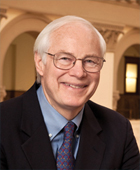 James A. Leach, is the ninth chairman of the National Endowment for the Humanities. Prior to being nominated by President Obama for the post, Leach was a Professor at the Woodrow Wilson School at Princeton University and Interim Director of the Institute of Politics and Lecturer at the John F. Kennedy School of Government at Harvard University. Leach’s brief stint in academia was preceded by 30 years of service as a representative in Congress where he chaired the Banking and Financial Services Committee, the Subcommittee on Asian and Pacific Affairs, and the Congressional-Executive Commission on China. Leach attended Princeton University, the School of Advanced International Studies of Johns Hopkins, and the London School of Economics. He holds thirteen honorary degrees, has received decorations from two foreign governments, and is the recipient of the Wayne Morse Integrity in Politics Award, the Adlai Stevenson Award from the United Nations Association, the Edgar Wayburn Award from the Sierra Club, the Norman Borlaug Public Service Award, and the Woodrow Wilson Medal from Princeton. The chairman served on the board of several public companies and a series of non-profit organizations, including the Century Foundation, the Carnegie Endowment for International Peace, the Kettering Foundation, Pro Publica and Common Cause, which he chaired. He is a member of the American Academy of Arts and Sciences, the Council on Foreign Relations, and formerly served as a trustee of Princeton University.
James A. Leach, is the ninth chairman of the National Endowment for the Humanities. Prior to being nominated by President Obama for the post, Leach was a Professor at the Woodrow Wilson School at Princeton University and Interim Director of the Institute of Politics and Lecturer at the John F. Kennedy School of Government at Harvard University. Leach’s brief stint in academia was preceded by 30 years of service as a representative in Congress where he chaired the Banking and Financial Services Committee, the Subcommittee on Asian and Pacific Affairs, and the Congressional-Executive Commission on China. Leach attended Princeton University, the School of Advanced International Studies of Johns Hopkins, and the London School of Economics. He holds thirteen honorary degrees, has received decorations from two foreign governments, and is the recipient of the Wayne Morse Integrity in Politics Award, the Adlai Stevenson Award from the United Nations Association, the Edgar Wayburn Award from the Sierra Club, the Norman Borlaug Public Service Award, and the Woodrow Wilson Medal from Princeton. The chairman served on the board of several public companies and a series of non-profit organizations, including the Century Foundation, the Carnegie Endowment for International Peace, the Kettering Foundation, Pro Publica and Common Cause, which he chaired. He is a member of the American Academy of Arts and Sciences, the Council on Foreign Relations, and formerly served as a trustee of Princeton University.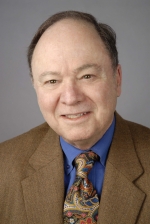 Robert Zemsky is a Professor at the University of Pennsylvania Graduate School of Education and Chair of The Learning Alliance for Higher Education. In The Chronicle for Higher Education, he has described himself as someone "old and round enough to be mistaken for a pooh-bah." In a forty-year career he has pioneered the use of market analyses for higher education, served as the University of Pennsylvania's chief planning officer and as the founding director of Penn's Institute for Research on Higher Education, as the Convener of the Pew Higher Education Roundtable, as Chair of The Learning Alliance, and as a member of the U.S. Secretary of Education's Commission On The Future Of Higher Education (better known as the Spellings Commission). More recently he has focused on what globalism might mean for higher education, on what technology has not accomplished, and on how to make learning more important in the higher education marketplace. His new book, Making Reform Work: The Case for Transforming American Higher Education, focuses on how the reform of higher education will likely depend on one or more dislodging events. Professor Zemsky earned his B.A. from Whittier College in 1962 and a Ph.D. in History from Yale University in 1966. In 1998 he received a Doctor of Humane Letters (Hon.) from Towson University and in 2008 a Doctor of Humane Letters (Hon.) from Franklin and Marshall College. In 2008 he retired from the Board of Trustees of Franklin and Marshall College after 25 years of service. That same year he was elected to the Board of Trustees of Whittier College, his alma mater. In 2011 Professor Zemsky was elected to the Sage Colleges Board of Trustees. In January 2012, Professor Zemsky was presented with the inaugural Robert Zemsky Medal for Innovation in Higher Education, awarded by Penn's Executive Doctorate in Higher Education Management Program.
Robert Zemsky is a Professor at the University of Pennsylvania Graduate School of Education and Chair of The Learning Alliance for Higher Education. In The Chronicle for Higher Education, he has described himself as someone "old and round enough to be mistaken for a pooh-bah." In a forty-year career he has pioneered the use of market analyses for higher education, served as the University of Pennsylvania's chief planning officer and as the founding director of Penn's Institute for Research on Higher Education, as the Convener of the Pew Higher Education Roundtable, as Chair of The Learning Alliance, and as a member of the U.S. Secretary of Education's Commission On The Future Of Higher Education (better known as the Spellings Commission). More recently he has focused on what globalism might mean for higher education, on what technology has not accomplished, and on how to make learning more important in the higher education marketplace. His new book, Making Reform Work: The Case for Transforming American Higher Education, focuses on how the reform of higher education will likely depend on one or more dislodging events. Professor Zemsky earned his B.A. from Whittier College in 1962 and a Ph.D. in History from Yale University in 1966. In 1998 he received a Doctor of Humane Letters (Hon.) from Towson University and in 2008 a Doctor of Humane Letters (Hon.) from Franklin and Marshall College. In 2008 he retired from the Board of Trustees of Franklin and Marshall College after 25 years of service. That same year he was elected to the Board of Trustees of Whittier College, his alma mater. In 2011 Professor Zemsky was elected to the Sage Colleges Board of Trustees. In January 2012, Professor Zemsky was presented with the inaugural Robert Zemsky Medal for Innovation in Higher Education, awarded by Penn's Executive Doctorate in Higher Education Management Program. Dr. Jimmy G. Cheek became the seventh chancellor of the University of Tennessee, Knoxville, on Feb. 1, 2009. Through his leadership, the campus is focused on improving the student’s educational experience, enhancing faculty research and scholarship as well as outreach and service. A first-generation college student, Dr. Cheek has set in motion several initiatives to broaden UT Knoxville’s diversity and student access to the university. As the state's flagship research campus, UT Knoxville is currently ranked as a Top 50 public institution. In early 2010, the campus launched its quest to become one of the Top 25 research universities in the nation. It helped solidify strategies for growing the research base and graduate programs, improving graduation rates and attracting and retaining top faculty. Dr. Cheek serves on the board of directors for the Association of Public and Land-grant Universities (APLU), as chairman of the group's Commission on Food, Environment and Renewable Resources ,and as a member of the APLU Presidential Advisory Committee on Energy. He also serves on the UT-Battelle Board of Governors. Dr. Cheek chairs the Board of the International Fertilizer Development Center Advisory Committee, a new global research effort to develop and commercialize clean, environmentally sustainable, cost-effective and renewable fertilizers for the developing world. Prior to his UT appointment, Dr. Cheek was a member of the faculty and an administrator at the University of Florida for 34 years, last serving as senior vice president of agricultural and natural resources. While at Florida, he received the President's Medallion and Student Body Resolution 2009-104 for dedicated and loyal service to the university and outstanding service to students, respectively, and the Morton Wolfson Faculty Award for outstanding contributions to the quality of student life. He was named to the Academy of Teaching Excellence in 2008, a Fellow of the American Association for Agricultural Education in 2005, and a Fellow of the North American Colleges and Teachers of Agriculture in 1998. His research has focused on the influence of experiential learning on student achievement and educational accountability. He has authored more than 80 journal articles and reports and is the senior author of a book. Dr. Cheek earned his bachelor’s degree with high honors and his doctorate from Texas A&M University. He received his master’s degree from Lamar University.
Dr. Jimmy G. Cheek became the seventh chancellor of the University of Tennessee, Knoxville, on Feb. 1, 2009. Through his leadership, the campus is focused on improving the student’s educational experience, enhancing faculty research and scholarship as well as outreach and service. A first-generation college student, Dr. Cheek has set in motion several initiatives to broaden UT Knoxville’s diversity and student access to the university. As the state's flagship research campus, UT Knoxville is currently ranked as a Top 50 public institution. In early 2010, the campus launched its quest to become one of the Top 25 research universities in the nation. It helped solidify strategies for growing the research base and graduate programs, improving graduation rates and attracting and retaining top faculty. Dr. Cheek serves on the board of directors for the Association of Public and Land-grant Universities (APLU), as chairman of the group's Commission on Food, Environment and Renewable Resources ,and as a member of the APLU Presidential Advisory Committee on Energy. He also serves on the UT-Battelle Board of Governors. Dr. Cheek chairs the Board of the International Fertilizer Development Center Advisory Committee, a new global research effort to develop and commercialize clean, environmentally sustainable, cost-effective and renewable fertilizers for the developing world. Prior to his UT appointment, Dr. Cheek was a member of the faculty and an administrator at the University of Florida for 34 years, last serving as senior vice president of agricultural and natural resources. While at Florida, he received the President's Medallion and Student Body Resolution 2009-104 for dedicated and loyal service to the university and outstanding service to students, respectively, and the Morton Wolfson Faculty Award for outstanding contributions to the quality of student life. He was named to the Academy of Teaching Excellence in 2008, a Fellow of the American Association for Agricultural Education in 2005, and a Fellow of the North American Colleges and Teachers of Agriculture in 1998. His research has focused on the influence of experiential learning on student achievement and educational accountability. He has authored more than 80 journal articles and reports and is the senior author of a book. Dr. Cheek earned his bachelor’s degree with high honors and his doctorate from Texas A&M University. He received his master’s degree from Lamar University. Coy F. Cross II authored the Morrill biography, Justin Smith Morrill: Father of the Land-grant Colleges (Michigan State University Press) after extensive research into Morrill's life, experiences and accomplishments. Dr. Cross, employed as an U.S. Air Force historian from 1988 until 2007, received his PhD in United States Diplomatic History from the University of California, Santa Barbara. He also holds an MA in United States and American Civil War History from California State University, Stanislaus and a BA from Florida State University. Dr. Cross has authored several other books and monographs, including his most recent "Lincoln's Man in Liverpool: Consul Dudley and and the Legal Battle to Stop Confederate Warships," published by Northern Illinois University Press in 2007.
Coy F. Cross II authored the Morrill biography, Justin Smith Morrill: Father of the Land-grant Colleges (Michigan State University Press) after extensive research into Morrill's life, experiences and accomplishments. Dr. Cross, employed as an U.S. Air Force historian from 1988 until 2007, received his PhD in United States Diplomatic History from the University of California, Santa Barbara. He also holds an MA in United States and American Civil War History from California State University, Stanislaus and a BA from Florida State University. Dr. Cross has authored several other books and monographs, including his most recent "Lincoln's Man in Liverpool: Consul Dudley and and the Legal Battle to Stop Confederate Warships," published by Northern Illinois University Press in 2007. Michael M. Crow became the sixteenth president of Arizona State University on July 1, 2002. He is guiding the transformation of ASU into one of the nation’s leading public metropolitan research universities, an institution that combines the highest levels of academic excellence, inclusiveness to a broad demographic, and maximum societal impact—a model he terms the “New American University.” Under his leadership ASU has established major interdisciplinary research initiatives such as the Biodesign Institute, Global Institute of Sustainability (GIOS), and more than a dozen new transdisciplinary schools, and witnessed an unprecedented academic infrastructure expansion, near tripling of research expenditures, and attainment of record levels of diversity in the student body. He was previously executive vice provost of Columbia University, where he served as chief strategist of Columbia’s research enterprise and technology transfer operations. A fellow of the National Academy of Public Administration, and member of the Council on Foreign Relations and U.S. Department of Commerce National Advisory Council on Innovation and Entrepreneurship, he is the author of books and articles analyzing science and technology policy and the design of knowledge enterprises. Crow received his Ph.D. in Public Administration (Science and Technology Policy) from the Maxwell School of Citizenship and Public Affairs, Syracuse University, in 1985.
Michael M. Crow became the sixteenth president of Arizona State University on July 1, 2002. He is guiding the transformation of ASU into one of the nation’s leading public metropolitan research universities, an institution that combines the highest levels of academic excellence, inclusiveness to a broad demographic, and maximum societal impact—a model he terms the “New American University.” Under his leadership ASU has established major interdisciplinary research initiatives such as the Biodesign Institute, Global Institute of Sustainability (GIOS), and more than a dozen new transdisciplinary schools, and witnessed an unprecedented academic infrastructure expansion, near tripling of research expenditures, and attainment of record levels of diversity in the student body. He was previously executive vice provost of Columbia University, where he served as chief strategist of Columbia’s research enterprise and technology transfer operations. A fellow of the National Academy of Public Administration, and member of the Council on Foreign Relations and U.S. Department of Commerce National Advisory Council on Innovation and Entrepreneurship, he is the author of books and articles analyzing science and technology policy and the design of knowledge enterprises. Crow received his Ph.D. in Public Administration (Science and Technology Policy) from the Maxwell School of Citizenship and Public Affairs, Syracuse University, in 1985. William B. Dabars is Research Fellow for University Design in the Office of the President, Arizona State University. He has served in various research capacities for the University of Southern California, University of California, Santa Barbara, and Getty Research Institute, where he participated in editorial projects focused on aesthetic and architectural theory. He has also served as an editorial consultant for the Getty Conservation Institute and University of Colorado, Boulder. He received a Ph.D. in History from the University of California, Los Angeles. His dissertation, current research, and forthcoming publications focus on the American research university.
William B. Dabars is Research Fellow for University Design in the Office of the President, Arizona State University. He has served in various research capacities for the University of Southern California, University of California, Santa Barbara, and Getty Research Institute, where he participated in editorial projects focused on aesthetic and architectural theory. He has also served as an editorial consultant for the Getty Conservation Institute and University of Colorado, Boulder. He received a Ph.D. in History from the University of California, Los Angeles. His dissertation, current research, and forthcoming publications focus on the American research university. James J. Duderstadt is President Emeritus and University Professor of Science and Engineering at the University of Michigan. A graduate of Yale and Caltech, Dr. Duderstadt’s teaching and research areas include nuclear science, applied physics, cyberinfrastructure, and science and education policy. He has served as chair of numerous National Academy and federal commissions, including the National Science Board and the Policy and Global Affairs Division of the National Research Council. At Michigan he currently directs the Science, Technology, and Public Policy program and the Millennium Project, a research center concerned with the impact of advanced technologies on society.
James J. Duderstadt is President Emeritus and University Professor of Science and Engineering at the University of Michigan. A graduate of Yale and Caltech, Dr. Duderstadt’s teaching and research areas include nuclear science, applied physics, cyberinfrastructure, and science and education policy. He has served as chair of numerous National Academy and federal commissions, including the National Science Board and the Policy and Global Affairs Division of the National Research Council. At Michigan he currently directs the Science, Technology, and Public Policy program and the Millennium Project, a research center concerned with the impact of advanced technologies on society. Ronald G. Ehrenberg is the Irving M. Ives Professor of Industrial and Labor Relations and Economics at Cornell University and a Stephen H. Weiss Presidential Fellow. He also is Director of the Cornell Higher Education Research Institute. From July 1, 1995 to June 30, 1998 he served as Cornell’s Vice President for Academic Programs, Planning and Budgeting. Ehrenberg served as a member of the Cornell Board of Trustees from July 1, 2006 to June 30, 2010 and currently serves on the SUNY Board of Trustees. He received a B.A. in mathematics from Harpur College (SUNY Binghamton) in 1966, M.A. and Ph.D. in economics from Northwestern University in 1970. He is a research associate at the National Bureau of Economic Research, a research fellow at IZA (Berlin), was a member of the Executive Committee of the American Economic Association, chaired the AAUP Committees on Retirement and the Economic Status of the Profession, and is Past President of the Society of Labor Economists. He also chaired the National Research Council's Board of Higher Education and served on its committee on Gender Differences in the Careers of Science, Engineering and Mathematics Faculty, the NACUBO Endowment Advisory Panel and The College Board’s Rethinking Student aid Study Group. Currently, Ehrenberg is a member of the Board of Trustees of Emeriti Retirement Health Solutions, and a member of the National Research Council Committees on Measuring Higher Education Productivity and Research Universities. Ehrenberg was the founding editor of Research in Labor Economics, and served a ten-year term as co-editor of the Journal of Human Resources. A member of the Cornell faculty for 35 years, he has authored or co-authored over 150 papers and authored or edited 26 books, including the leading textbook, Modern Labor Economics: Theory and Public Policy. His recent research has focused on higher education issues. He is the editor of American University: National Treasure or Endangered Species (Cornell University Press, 1997) and the author of Tuition Rising: Why College Costs So Much (Harvard University Press, 2002). He is the editor of Governing Academia (Cornell University Press, 2004), and What’s Happening to Public Higher Education? (Johns Hopkins University Press, 2007), and coeditor of Science and the University (University of Wisconsin Press, 2007) and Doctoral Education and the Faculty of the Future (Cornell University Press, 2008). Ehrenberg is a coauthor of Educating Scholars: Doctoral Education in the Humanities (Princeton University Press, 2010).
Ronald G. Ehrenberg is the Irving M. Ives Professor of Industrial and Labor Relations and Economics at Cornell University and a Stephen H. Weiss Presidential Fellow. He also is Director of the Cornell Higher Education Research Institute. From July 1, 1995 to June 30, 1998 he served as Cornell’s Vice President for Academic Programs, Planning and Budgeting. Ehrenberg served as a member of the Cornell Board of Trustees from July 1, 2006 to June 30, 2010 and currently serves on the SUNY Board of Trustees. He received a B.A. in mathematics from Harpur College (SUNY Binghamton) in 1966, M.A. and Ph.D. in economics from Northwestern University in 1970. He is a research associate at the National Bureau of Economic Research, a research fellow at IZA (Berlin), was a member of the Executive Committee of the American Economic Association, chaired the AAUP Committees on Retirement and the Economic Status of the Profession, and is Past President of the Society of Labor Economists. He also chaired the National Research Council's Board of Higher Education and served on its committee on Gender Differences in the Careers of Science, Engineering and Mathematics Faculty, the NACUBO Endowment Advisory Panel and The College Board’s Rethinking Student aid Study Group. Currently, Ehrenberg is a member of the Board of Trustees of Emeriti Retirement Health Solutions, and a member of the National Research Council Committees on Measuring Higher Education Productivity and Research Universities. Ehrenberg was the founding editor of Research in Labor Economics, and served a ten-year term as co-editor of the Journal of Human Resources. A member of the Cornell faculty for 35 years, he has authored or co-authored over 150 papers and authored or edited 26 books, including the leading textbook, Modern Labor Economics: Theory and Public Policy. His recent research has focused on higher education issues. He is the editor of American University: National Treasure or Endangered Species (Cornell University Press, 1997) and the author of Tuition Rising: Why College Costs So Much (Harvard University Press, 2002). He is the editor of Governing Academia (Cornell University Press, 2004), and What’s Happening to Public Higher Education? (Johns Hopkins University Press, 2007), and coeditor of Science and the University (University of Wisconsin Press, 2007) and Doctoral Education and the Faculty of the Future (Cornell University Press, 2008). Ehrenberg is a coauthor of Educating Scholars: Doctoral Education in the Humanities (Princeton University Press, 2010). Judy Genshaft was appointed president of the University of South Florida System in July 2000. With campuses in Tampa, St. Petersburg, Sarasota-Manatee and Lakeland, the USF System serves more than 47,000 students in more than 232 degree programs on the undergraduate, master's, specialist and doctoral levels, including the doctor of medicine. Today the university has an annual budget of more than $1.6 billion. Under President Genshaft's leadership, USF has grown to be the 9th largest public research university in the nation and one of 63 public research universities named to the top tier (very high research activity) of the Carnegie Foundation for the Advancement of Teaching. USF provides more than $3.7 billion annual economic impact on the Tampa Bay regional economy and is one of the top employers in the Tampa Bay region. President Genshaft has established herself as a leader for economic development, especially related to high-technology and bioscience. She has focused on partnering university research -- which under her leadership is more than $390 million -- with corporate and entrepreneurial partners. Nationally, she chairs the NCAA Board of Directors and is a past chair of the American Council on Education. She serves on the executive committee of the board of the Association of Public Land-grant Universities. Prior to joining USF, President Genshaft served as provost and vice president for academic affairs at the University at Albany, State University of New York. She also held various positions during a sixteen-year tenure at The Ohio State University. She holds a bachelor's degree in social work and psychology from the University of Wisconsin at Madison, a master's degree in school counseling from Kent State University, and a doctorate in counseling psychology from Kent State. She has authored and co-authored 69 journal articles and three books.
Judy Genshaft was appointed president of the University of South Florida System in July 2000. With campuses in Tampa, St. Petersburg, Sarasota-Manatee and Lakeland, the USF System serves more than 47,000 students in more than 232 degree programs on the undergraduate, master's, specialist and doctoral levels, including the doctor of medicine. Today the university has an annual budget of more than $1.6 billion. Under President Genshaft's leadership, USF has grown to be the 9th largest public research university in the nation and one of 63 public research universities named to the top tier (very high research activity) of the Carnegie Foundation for the Advancement of Teaching. USF provides more than $3.7 billion annual economic impact on the Tampa Bay regional economy and is one of the top employers in the Tampa Bay region. President Genshaft has established herself as a leader for economic development, especially related to high-technology and bioscience. She has focused on partnering university research -- which under her leadership is more than $390 million -- with corporate and entrepreneurial partners. Nationally, she chairs the NCAA Board of Directors and is a past chair of the American Council on Education. She serves on the executive committee of the board of the Association of Public Land-grant Universities. Prior to joining USF, President Genshaft served as provost and vice president for academic affairs at the University at Albany, State University of New York. She also held various positions during a sixteen-year tenure at The Ohio State University. She holds a bachelor's degree in social work and psychology from the University of Wisconsin at Madison, a master's degree in school counseling from Kent State University, and a doctorate in counseling psychology from Kent State. She has authored and co-authored 69 journal articles and three books. Domenico Grasso is the Vice President for Research and Dean of the Graduate College at the University of Vermont (UVM). Prior to holding this position, he was the Dean of the College of Engineering and Mathematical Sciences (CEMS) at UVM. Prior to joining UVM, Professor Grasso was Rosemary Bradford Hewlett Professor and Founding Director of the Picker Engineering Program at Smith College, the first engineering program at a women's college in the United States, and Professor and Head of Department in Civil & Environmental Engineering at the University of Connecticut. He has been a Vice Chair, EPA Science Advisory Board, Visiting Scholar at UC-Berkeley, a NATO Fellow, and an Invited Technical Expert to the United Nations Industrial Development Organization in Vienna, Austria.He holds a B.Sc. from Worcester Polytechnic Institute, an M.S. from Purdue University and a Ph.D. from The University of Michigan. He is a registered Professional Engineer in the states of Connecticut and Texas, and a Diplomate of the American Academy of Environmental Engineers.
Domenico Grasso is the Vice President for Research and Dean of the Graduate College at the University of Vermont (UVM). Prior to holding this position, he was the Dean of the College of Engineering and Mathematical Sciences (CEMS) at UVM. Prior to joining UVM, Professor Grasso was Rosemary Bradford Hewlett Professor and Founding Director of the Picker Engineering Program at Smith College, the first engineering program at a women's college in the United States, and Professor and Head of Department in Civil & Environmental Engineering at the University of Connecticut. He has been a Vice Chair, EPA Science Advisory Board, Visiting Scholar at UC-Berkeley, a NATO Fellow, and an Invited Technical Expert to the United Nations Industrial Development Organization in Vienna, Austria.He holds a B.Sc. from Worcester Polytechnic Institute, an M.S. from Purdue University and a Ph.D. from The University of Michigan. He is a registered Professional Engineer in the states of Connecticut and Texas, and a Diplomate of the American Academy of Environmental Engineers. Martha Heath is chair of the Appropriations Committee of the Vermont House of Representatives, where she has served since 1993. A native of Newport, Vermont, where she attended public schools, Representative Heath earned her B.S. degree at the University of Vermont in 1969. She served on the University of Vermont Board of Trustees for twelve years, from 1997 to 2009, including service as chair of the Educational Policy and Institutional Resources Committee and as Vice Chair of the Board. She has served, in addition, on many other boards: current service includes the Westford School Board; the Chittenden Central Supervisory Union School Board; the Board of Trustees of the Vermont Student Assistance Corporation; the Board of the Governor's Institutes of Vermont; and the Board of Trustees of Camp Thorpe. She is Democrat and resides in Westford, Vermont.
Martha Heath is chair of the Appropriations Committee of the Vermont House of Representatives, where she has served since 1993. A native of Newport, Vermont, where she attended public schools, Representative Heath earned her B.S. degree at the University of Vermont in 1969. She served on the University of Vermont Board of Trustees for twelve years, from 1997 to 2009, including service as chair of the Educational Policy and Institutional Resources Committee and as Vice Chair of the Board. She has served, in addition, on many other boards: current service includes the Westford School Board; the Chittenden Central Supervisory Union School Board; the Board of Trustees of the Vermont Student Assistance Corporation; the Board of the Governor's Institutes of Vermont; and the Board of Trustees of Camp Thorpe. She is Democrat and resides in Westford, Vermont. John Hudzik is Professor at Michigan State University and NAFSA Senior Scholar for Internationalization. He is past President and Chair of the Board of Directors of NAFSA, Association of International Educators, and past President of the Association of International Education Administrators (AIEA). From 1995 to 2010, he was Dean of International Studies and Programs at Michigan State University and then Vice President for Global Engagement and Strategic Projects. He was Acting University Provost and Vice President of Academic Affairs at MSU in 2005. He has served on numerous international policy and advisory boards for international development, regional studies, higher education internationalization, and education abroad; he is a frequently invited commentator and speaker at national and international conferences on the direction of global higher education and internationalization, and publishes frequently on these topics. He is an internationally recognized scholar and consultant on judicial reform and judicial administration and Professor of Criminal Justice. He is the author of numerous books, monographs and articles on both international education and judicial administration and a member of the Academy of Criminal Justice Sciences and the National Association of State Judicial Educators, NAFSA, AIEA, EAIE and APAIE. He is recipient of several national awards for his scholarly work in judicial systems and in international education.
John Hudzik is Professor at Michigan State University and NAFSA Senior Scholar for Internationalization. He is past President and Chair of the Board of Directors of NAFSA, Association of International Educators, and past President of the Association of International Education Administrators (AIEA). From 1995 to 2010, he was Dean of International Studies and Programs at Michigan State University and then Vice President for Global Engagement and Strategic Projects. He was Acting University Provost and Vice President of Academic Affairs at MSU in 2005. He has served on numerous international policy and advisory boards for international development, regional studies, higher education internationalization, and education abroad; he is a frequently invited commentator and speaker at national and international conferences on the direction of global higher education and internationalization, and publishes frequently on these topics. He is an internationally recognized scholar and consultant on judicial reform and judicial administration and Professor of Criminal Justice. He is the author of numerous books, monographs and articles on both international education and judicial administration and a member of the Academy of Criminal Justice Sciences and the National Association of State Judicial Educators, NAFSA, AIEA, EAIE and APAIE. He is recipient of several national awards for his scholarly work in judicial systems and in international education. Jane E. Knodell was appointed Provost and Senior Vice President of the University of Vermont on December 13, 2010. Professor Knodell served as Interim Provost and Senior Vice President beginning July 1, 2009. She has been a member of the faculty of the University of Vermont since 1986, and has served the University in a variety of administrative roles, including Chair of the Department of Economics, Interim Dean and Associate Dean of the College of Arts and Sciences, and Associate Provost for Budget and Capital Planning. Knodell earned her bachelor's degree with honors and distinction in 1976 from Stanford University, and her Ph.D. in Economics, also from Stanford, in 1984. Her work on the monetary history of the U.S. is wide-ranging, exploring stabilization and integration by the Second Bank of the United States in the 1820s, the evolution of open market operations by the Federal Reserve Bank in the 1920s, and the causes and effects of the financial deregulation of the late twentieth century. Knodell's work on the nature and role of early central banking institutions has been published in leading economic and financial history journals. Knodell is an active member of the Burlington community, having served on the City Council from 1993-1997, and again from 1999-2009. She was elected President of the City Council in 1999 and 2000. She has also served on a variety of Vermont non-profits and municipal boards seeking to advance economic development through enhanced access to capital.
Jane E. Knodell was appointed Provost and Senior Vice President of the University of Vermont on December 13, 2010. Professor Knodell served as Interim Provost and Senior Vice President beginning July 1, 2009. She has been a member of the faculty of the University of Vermont since 1986, and has served the University in a variety of administrative roles, including Chair of the Department of Economics, Interim Dean and Associate Dean of the College of Arts and Sciences, and Associate Provost for Budget and Capital Planning. Knodell earned her bachelor's degree with honors and distinction in 1976 from Stanford University, and her Ph.D. in Economics, also from Stanford, in 1984. Her work on the monetary history of the U.S. is wide-ranging, exploring stabilization and integration by the Second Bank of the United States in the 1820s, the evolution of open market operations by the Federal Reserve Bank in the 1920s, and the causes and effects of the financial deregulation of the late twentieth century. Knodell's work on the nature and role of early central banking institutions has been published in leading economic and financial history journals. Knodell is an active member of the Burlington community, having served on the City Council from 1993-1997, and again from 1999-2009. She was elected President of the City Council in 1999 and 2000. She has also served on a variety of Vermont non-profits and municipal boards seeking to advance economic development through enhanced access to capital. Douglas O. Lantagne is the Dean and Director of Extension at the University of Vermont. He spent 14 years at Michigan State University in an Extension/research position before moving to UVM. Dr. Lantagne has held several positions with University of Vermont Extension, including northwest regional chair, associate director, interim director and now dean and director. During that same time, he chaired the New England Extension Director's association and the Northeast Association of Extension Directors, completed a four-year term as a member of Extension Committee on Organization and Policy (ECOP), chaired the search committee chair for the new ECOP national executive director, and served on various other national committees and task forces. He has recently rejoined ECOP as a representative from the Northeast Region and is current past chair of ECOP. Dr. Lantagne is also a fellow from the first class of the Food System Leadership Institute (FSLI). Under his leadership, UVM Extension is a strong proponent of the food systems transdisciplinary research, education and outreach Spire of Excellence recently embraced by the faculty and leadership at the University of Vermont.
Douglas O. Lantagne is the Dean and Director of Extension at the University of Vermont. He spent 14 years at Michigan State University in an Extension/research position before moving to UVM. Dr. Lantagne has held several positions with University of Vermont Extension, including northwest regional chair, associate director, interim director and now dean and director. During that same time, he chaired the New England Extension Director's association and the Northeast Association of Extension Directors, completed a four-year term as a member of Extension Committee on Organization and Policy (ECOP), chaired the search committee chair for the new ECOP national executive director, and served on various other national committees and task forces. He has recently rejoined ECOP as a representative from the Northeast Region and is current past chair of ECOP. Dr. Lantagne is also a fellow from the first class of the Food System Leadership Institute (FSLI). Under his leadership, UVM Extension is a strong proponent of the food systems transdisciplinary research, education and outreach Spire of Excellence recently embraced by the faculty and leadership at the University of Vermont. Fayneese Miller is dean of the College of Education and Social Services and professor of Human Development, Educational Leadership and Social Policy at the University of Vermont. Prior to her appointment as dean at UVM, she was associate professor of education and human development and a past director of the Center for the Study of Race & Ethnicity in America at Brown University. Dr. Miller developed and chaired the first Ethnic Studies Program at Brown University. Dr. Miller is a social psychologist and specializes in the psychosocial development of youth, with special emphasis on such topics as alienation, social identity, and cross-racial friendships. She has conducted research on black males that was funded by the Eli Lily Foundation. Her work includes a study on perceptions of racial/ethnic bias for the Rhode Island Supreme Court and a project on school-based truancy courts for the Rhode Island Family Court. Dr. Miller serves on the U.S. Department of Justice's National Truancy Prevention Association (NTPA) Board. In collaboration with NTPA, she completed a benchbook on truancy for family court judges. Dr. Miller was a visiting professor at the University of Cape Town in South Africa, a National Science Foundation Fellow, and Salzburg Fellow. She was a member of the American Academy of Arts and Science Task Force on diversity in higher education and the Annie Casey Foundation and Joint Center for Political Studies focus group on reproductive health. She was a member of the American Council of Education (ACE) 2004-2005 Fellow's class—a Washington-based fellowship program that prepares future senior executives in higher education. She was also a Millennium Leadership Fellow (MLI). Dr. Miller recently completed a book entitled Transforming Learning Environments: Strategies for the Next Generation to be published in November 20112 by Emerald Publishing Group. A second book with Emerald, focused on adolescent social behavior and co-authored with Dr. George Leibowitz, will be published in the fall of 2013. Dr. Miller is the chair-elect of the board for the American Association for College's of Education (AACTE), president-elect for the Council of Academic Dean's from Research Education Institutions (CADREI), Vermont's higher education lead for Smarter Balance, and a past member and chairman of the Vermont State Board of Education.
Fayneese Miller is dean of the College of Education and Social Services and professor of Human Development, Educational Leadership and Social Policy at the University of Vermont. Prior to her appointment as dean at UVM, she was associate professor of education and human development and a past director of the Center for the Study of Race & Ethnicity in America at Brown University. Dr. Miller developed and chaired the first Ethnic Studies Program at Brown University. Dr. Miller is a social psychologist and specializes in the psychosocial development of youth, with special emphasis on such topics as alienation, social identity, and cross-racial friendships. She has conducted research on black males that was funded by the Eli Lily Foundation. Her work includes a study on perceptions of racial/ethnic bias for the Rhode Island Supreme Court and a project on school-based truancy courts for the Rhode Island Family Court. Dr. Miller serves on the U.S. Department of Justice's National Truancy Prevention Association (NTPA) Board. In collaboration with NTPA, she completed a benchbook on truancy for family court judges. Dr. Miller was a visiting professor at the University of Cape Town in South Africa, a National Science Foundation Fellow, and Salzburg Fellow. She was a member of the American Academy of Arts and Science Task Force on diversity in higher education and the Annie Casey Foundation and Joint Center for Political Studies focus group on reproductive health. She was a member of the American Council of Education (ACE) 2004-2005 Fellow's class—a Washington-based fellowship program that prepares future senior executives in higher education. She was also a Millennium Leadership Fellow (MLI). Dr. Miller recently completed a book entitled Transforming Learning Environments: Strategies for the Next Generation to be published in November 20112 by Emerald Publishing Group. A second book with Emerald, focused on adolescent social behavior and co-authored with Dr. George Leibowitz, will be published in the fall of 2013. Dr. Miller is the chair-elect of the board for the American Association for College's of Education (AACTE), president-elect for the Council of Academic Dean's from Research Education Institutions (CADREI), Vermont's higher education lead for Smarter Balance, and a past member and chairman of the Vermont State Board of Education. M. Peter McPherson has been president of the Association of Public and Land Grant Universities since 2004. Before joining A۰P۰L۰U, he was president for more than eleven years (1993-2004) of Michigan State University. He has also served as Deputy Secretary of the United States Treasury, as Administrator of the U. S. Agency for International Development, as Director of Economic Policy for the Coalition Provisional Authority of Iraq. He is the former chair of the Board of Directors of Dow Jones and Company and the founding co-chair of the Partnership to Cut Hunger and Poverty in Africa. A Special Assistant in the White House to President Gerald Ford, he also has been a partner—and head of the Washington office—of the Ohio law firm Vorys, Sater, Seymour, and Pease. He has received numerous awards (from the Departments of State and Treasury, UNICEF, and the Jewish National Fund, among others). He received a B.A. from Michigan State University, an M.B.A. from Western Michigan University, and a J.D. from American University.
M. Peter McPherson has been president of the Association of Public and Land Grant Universities since 2004. Before joining A۰P۰L۰U, he was president for more than eleven years (1993-2004) of Michigan State University. He has also served as Deputy Secretary of the United States Treasury, as Administrator of the U. S. Agency for International Development, as Director of Economic Policy for the Coalition Provisional Authority of Iraq. He is the former chair of the Board of Directors of Dow Jones and Company and the founding co-chair of the Partnership to Cut Hunger and Poverty in Africa. A Special Assistant in the White House to President Gerald Ford, he also has been a partner—and head of the Washington office—of the Ohio law firm Vorys, Sater, Seymour, and Pease. He has received numerous awards (from the Departments of State and Treasury, UNICEF, and the Jewish National Fund, among others). He received a B.A. from Michigan State University, an M.B.A. from Western Michigan University, and a J.D. from American University. David Shulenburger, A۰P۰L۰U Senior Fellow, was A۰P۰L۰U’s first Vice President for Academic Affairs. He served as Provost and Executive Vice Chancellor of the University of Kansas from 1993 to 2006. He was chair of the Board of Directors of the Center for Research Libraries, a member of the National Commission on Writing, and a BioOne board member. He currently serves as a Consulting Editor for Change Magazine. Shulenburger writes and speaks nationally and internationally on the economics of higher education and scholarly communications and accountability in higher education. He holds a Ph.D. from the University of Illinois.
David Shulenburger, A۰P۰L۰U Senior Fellow, was A۰P۰L۰U’s first Vice President for Academic Affairs. He served as Provost and Executive Vice Chancellor of the University of Kansas from 1993 to 2006. He was chair of the Board of Directors of the Center for Research Libraries, a member of the National Commission on Writing, and a BioOne board member. He currently serves as a Consulting Editor for Change Magazine. Shulenburger writes and speaks nationally and internationally on the economics of higher education and scholarly communications and accountability in higher education. He holds a Ph.D. from the University of Illinois. Tom Sullivan, with his appointment effective July 15, 2012, became the 26th President of the University of Vermont. Previously, he had served as Senior Vice President for Academic Affairs and Provost at the University of Minnesota from July 2004 through January 2012. He also served as the eighth dean of the University of Minnesota Law School from 1995 to 2002. Upon finishing his term as dean, he returned to full-time research and teaching. In June of 2003, he received the J. William Elwin, Jr., Award from the American Bar Association Section of Legal Education for leadership and contributions to law school development. At the University of Minnesota Law School, he has received the Stanley V. Kinyon Teacher of the Year Award for Excellence in Teaching. In 2005, he was appointed the Julius E. Davis Chair in Law. He has chaired the ABA Section of Legal Education, and has chaired the Association of American Law Schools Section on Antitrust and Economic Regulation. On several occasions, he has been a consultant to the U.S. Senate Judiciary Committee on judicial nominations to the Supreme Court, and to the U.S. Senate Commerce Committee on mergers. He is a nationally recognized authority on antitrust law and complex litigation, having authored ten books and over 50 articles. He and co-author Professor Richard Frase published Proportionality Principles in American Law: Controlling Excessive Government Actions (Oxford University Press, 2009). He is the co-author, with Professors Herbert Hovencamp and Howard Shelanksi of Antitrust Law, Policy, and Procedure (6th ed., 2009) and co-author with Professor Jeffrey Harrison of Understanding Antitrust and Its Economic Implications (5th ed., 2009). Most recently, he published Complex Litigation with Professors Richard Freer, Doug Floyd and Brad Clary (2010). He also published Private Antitrust Actions (Little, Brown & Co., 1996) with Douglas Floyd. He is presently writing a book entitled The Arc of Due Process in American Constitutional Law.
Tom Sullivan, with his appointment effective July 15, 2012, became the 26th President of the University of Vermont. Previously, he had served as Senior Vice President for Academic Affairs and Provost at the University of Minnesota from July 2004 through January 2012. He also served as the eighth dean of the University of Minnesota Law School from 1995 to 2002. Upon finishing his term as dean, he returned to full-time research and teaching. In June of 2003, he received the J. William Elwin, Jr., Award from the American Bar Association Section of Legal Education for leadership and contributions to law school development. At the University of Minnesota Law School, he has received the Stanley V. Kinyon Teacher of the Year Award for Excellence in Teaching. In 2005, he was appointed the Julius E. Davis Chair in Law. He has chaired the ABA Section of Legal Education, and has chaired the Association of American Law Schools Section on Antitrust and Economic Regulation. On several occasions, he has been a consultant to the U.S. Senate Judiciary Committee on judicial nominations to the Supreme Court, and to the U.S. Senate Commerce Committee on mergers. He is a nationally recognized authority on antitrust law and complex litigation, having authored ten books and over 50 articles. He and co-author Professor Richard Frase published Proportionality Principles in American Law: Controlling Excessive Government Actions (Oxford University Press, 2009). He is the co-author, with Professors Herbert Hovencamp and Howard Shelanksi of Antitrust Law, Policy, and Procedure (6th ed., 2009) and co-author with Professor Jeffrey Harrison of Understanding Antitrust and Its Economic Implications (5th ed., 2009). Most recently, he published Complex Litigation with Professors Richard Freer, Doug Floyd and Brad Clary (2010). He also published Private Antitrust Actions (Little, Brown & Co., 1996) with Douglas Floyd. He is presently writing a book entitled The Arc of Due Process in American Constitutional Law. Thomas C. Vogelmann became Dean of the College of Agriculture and Life Sciences and Director of the Vermont Agricultural Experiment Station at the University of Vermont (UVM) in 2009, after holding positions of Interim Dean from July 2008, and Professor and Chair of the Department of Plant Biology from 2002. A graduate of Syracuse University (Ph.D.), Washington State University (M.S.) and the University of Vermont (B.S.), Dr. Vogelmann worked for eighteen years at the University of Wyoming, where he attained the rank of Professor of Botany and served as the Interim Chair of the Department of Botany. He also served as Visiting Professor at the University of Lund in Lund, Sweden, and Visiting Research Fellow at the Australian National University in Canberra, Australia. Dr. Vogelmann has received numerous awards and other recognitions for his teaching, research, and service, including the Robertson Lecture for Outstanding Contributions to Plant Physiology conferred by the Australian and New Zealand Societies for Plant Physiology. He also received the Presidential Award for Outstanding Research, the College of Arts and Sciences Award for Outstanding Research, and the Elbogen Award for Outstanding Teaching, all at the University of Wyoming. Most recently, he received the Joseph E. Carrigan Award for Excellence in Teaching and Undergraduate Education in the College of Agriculture and Life Sciences at UVM. Dr. Vogelmann specializes in plant physiology and has published more than eighty scientific papers in refereed journals, books, and technical proceedings.
Thomas C. Vogelmann became Dean of the College of Agriculture and Life Sciences and Director of the Vermont Agricultural Experiment Station at the University of Vermont (UVM) in 2009, after holding positions of Interim Dean from July 2008, and Professor and Chair of the Department of Plant Biology from 2002. A graduate of Syracuse University (Ph.D.), Washington State University (M.S.) and the University of Vermont (B.S.), Dr. Vogelmann worked for eighteen years at the University of Wyoming, where he attained the rank of Professor of Botany and served as the Interim Chair of the Department of Botany. He also served as Visiting Professor at the University of Lund in Lund, Sweden, and Visiting Research Fellow at the Australian National University in Canberra, Australia. Dr. Vogelmann has received numerous awards and other recognitions for his teaching, research, and service, including the Robertson Lecture for Outstanding Contributions to Plant Physiology conferred by the Australian and New Zealand Societies for Plant Physiology. He also received the Presidential Award for Outstanding Research, the College of Arts and Sciences Award for Outstanding Research, and the Elbogen Award for Outstanding Teaching, all at the University of Wyoming. Most recently, he received the Joseph E. Carrigan Award for Excellence in Teaching and Undergraduate Education in the College of Agriculture and Life Sciences at UVM. Dr. Vogelmann specializes in plant physiology and has published more than eighty scientific papers in refereed journals, books, and technical proceedings. Dave Wolk came to the presidency of Castleton State College in December 2001 after intertwined careers in education and government. He has been a guidance counselor and teacher at Mount St Joseph Academy, Principal of Barstow Memorial School in Chittenden, Principal of Rutland High School, Superintendent of Schools in Rutland City, and Vermont's Commissioner of Education. He was a Vermont state senator and Governor Howard Dean's Chief of Policy. He has served on and/or led over forty public policy boards and commissions. At Castleton he has overseen expansion of academic programs, the arts, athletics, and co-curricular activities, as well as an increased involvement by the college in the local community and an expanded commitment to civic engagement and service-learning. New construction has included five new residence halls, fitness centers, Campus Center, Spartan Stadium, radio station, television studio, Spartan Athletic Complex, Communication Department, an enlarged and renovated science center and renovated fine arts center, and renovation and expansion of the new Spartan Arena in Rutland. President Wolk was born and grew up in Rutland. He graduated from Rutland High School and then Middlebury College with a degree in political science. He earned a master's degree in educational administration and planning at UVM and a certificate of advanced graduate study at Harvard University. His many honors include a 2012 Honorary Doctor of Letters degree from Middlebury College, the 2009 Award for Lifetime Achievement from the New England Board of Higher Education, the 2008 Business Person of the Year from the Rutland Region Chamber of Commerce, the 2006 Distinguished American Award, the 2004 Distinguished Citizen of the Year Award, and various leadership and community service awards as a legislator and educator.
Dave Wolk came to the presidency of Castleton State College in December 2001 after intertwined careers in education and government. He has been a guidance counselor and teacher at Mount St Joseph Academy, Principal of Barstow Memorial School in Chittenden, Principal of Rutland High School, Superintendent of Schools in Rutland City, and Vermont's Commissioner of Education. He was a Vermont state senator and Governor Howard Dean's Chief of Policy. He has served on and/or led over forty public policy boards and commissions. At Castleton he has overseen expansion of academic programs, the arts, athletics, and co-curricular activities, as well as an increased involvement by the college in the local community and an expanded commitment to civic engagement and service-learning. New construction has included five new residence halls, fitness centers, Campus Center, Spartan Stadium, radio station, television studio, Spartan Athletic Complex, Communication Department, an enlarged and renovated science center and renovated fine arts center, and renovation and expansion of the new Spartan Arena in Rutland. President Wolk was born and grew up in Rutland. He graduated from Rutland High School and then Middlebury College with a degree in political science. He earned a master's degree in educational administration and planning at UVM and a certificate of advanced graduate study at Harvard University. His many honors include a 2012 Honorary Doctor of Letters degree from Middlebury College, the 2009 Award for Lifetime Achievement from the New England Board of Higher Education, the 2008 Business Person of the Year from the Rutland Region Chamber of Commerce, the 2006 Distinguished American Award, the 2004 Distinguished Citizen of the Year Award, and various leadership and community service awards as a legislator and educator. Nancy L. Zimpher became the 12th Chancellor of the State University of New York in June 2009. A nationally recognized leader in education, Chancellor Zimpher spearheaded and launched a new strategic plan for SUNY in her first year as chancellor. The central goal of the plan, called The Power of SUNY, is to harness the university’s potential to drive economic revitalization and create a better future for every community across New York. Chancellor Zimpher is active in numerous state and national education organizations and is a leader in the areas of teacher preparation, urban education, and university-community engagement. As co-founder of Strive, a community-based cradle-to-career collaborative, Zimpher has been instrumental in creating a national network of innovative systemic partnerships that holistically address challenges across the education pipeline.
Nancy L. Zimpher became the 12th Chancellor of the State University of New York in June 2009. A nationally recognized leader in education, Chancellor Zimpher spearheaded and launched a new strategic plan for SUNY in her first year as chancellor. The central goal of the plan, called The Power of SUNY, is to harness the university’s potential to drive economic revitalization and create a better future for every community across New York. Chancellor Zimpher is active in numerous state and national education organizations and is a leader in the areas of teacher preparation, urban education, and university-community engagement. As co-founder of Strive, a community-based cradle-to-career collaborative, Zimpher has been instrumental in creating a national network of innovative systemic partnerships that holistically address challenges across the education pipeline.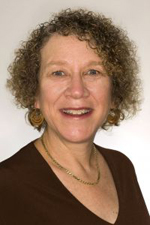 Goldie Blumenstyk is Senior Writer at The Chronicle of Higher Education. As a reporter and editor at The Chronicle of Higher Education since the late 1980s, Goldie Blumenstyk has covered topics touching every corner of higher education, including distance education, the Internet boom and bust, state politics, university governance, and fund raising. She is nationally known for her expertise on for-profit higher education, college finances, and university patents and the commercialization of academic research. She has reported for The Chronicle from several countries in Europe and from China, and her stories have received numerous awards, including First Place from the Education Writers Association for 2011 for beat reporting on the Business of Higher Education. Her articles on colleges' relationship with industry, including their efforts to become biotech hubs and their dealings with corporate giants like BP, ExxonMobil, and Novartis, have been widely cited by other experts. Blumenstyk earned a bachelor’s degree in history from Colgate University and a master’s from the Columbia University Graduate School of Journalism. Before joining The Chronicle, she covered politics and government for The Orlando Sentinel, in Florida, including a stint as city hall reporter.
Goldie Blumenstyk is Senior Writer at The Chronicle of Higher Education. As a reporter and editor at The Chronicle of Higher Education since the late 1980s, Goldie Blumenstyk has covered topics touching every corner of higher education, including distance education, the Internet boom and bust, state politics, university governance, and fund raising. She is nationally known for her expertise on for-profit higher education, college finances, and university patents and the commercialization of academic research. She has reported for The Chronicle from several countries in Europe and from China, and her stories have received numerous awards, including First Place from the Education Writers Association for 2011 for beat reporting on the Business of Higher Education. Her articles on colleges' relationship with industry, including their efforts to become biotech hubs and their dealings with corporate giants like BP, ExxonMobil, and Novartis, have been widely cited by other experts. Blumenstyk earned a bachelor’s degree in history from Colgate University and a master’s from the Columbia University Graduate School of Journalism. Before joining The Chronicle, she covered politics and government for The Orlando Sentinel, in Florida, including a stint as city hall reporter.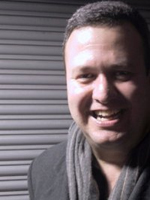 Scott Jaschik is one of the three founders of Inside Higher Ed. With Doug Lederman, he leads the editorial operations of Inside Higher Ed, overseeing news content, opinion pieces, career advice, blogs and other features. Scott is a leading voice on higher education issues, quoted regularly in publications nationwide, and publishing articles on colleges in publications such as The New York Times, The Boston Globe, The Washington Post, Salon, and elsewhere. He has been a judge or screener for the National Magazine Awards, the Online Journalism Awards, the Folio Editorial Excellence Awards, and the Education Writers Association Awards. Scott served as a mentor in the community college fellowship program of the Hechinger Institute on Education and the Media, of Teachers College, Columbia University. He is a member of the board of the Education Writers Association. From 1999-2003, Scott was editor of The Chronicle of Higher Education. Scott grew up in Rochester, New York, and graduated from Cornell University in 1985. He lives in Washington.
Scott Jaschik is one of the three founders of Inside Higher Ed. With Doug Lederman, he leads the editorial operations of Inside Higher Ed, overseeing news content, opinion pieces, career advice, blogs and other features. Scott is a leading voice on higher education issues, quoted regularly in publications nationwide, and publishing articles on colleges in publications such as The New York Times, The Boston Globe, The Washington Post, Salon, and elsewhere. He has been a judge or screener for the National Magazine Awards, the Online Journalism Awards, the Folio Editorial Excellence Awards, and the Education Writers Association Awards. Scott served as a mentor in the community college fellowship program of the Hechinger Institute on Education and the Media, of Teachers College, Columbia University. He is a member of the board of the Education Writers Association. From 1999-2003, Scott was editor of The Chronicle of Higher Education. Scott grew up in Rochester, New York, and graduated from Cornell University in 1985. He lives in Washington. Tamar Lewin is a national reporter covering education. Ms. Lewin was a contributor to the Pulitzer Prize-winning series, "How Race is Lived In America," in 2000 and the "Class Matters" series in 2005. Ms. Lewin joined The Times in 1982 as a financial reporter, with the column "Business and the Law," which appeared bi-weekly in the business section. In 1987, she moved to the national desk and has since covered social policy issues, health, aging, family and gender issues, and most recently, education.
Tamar Lewin is a national reporter covering education. Ms. Lewin was a contributor to the Pulitzer Prize-winning series, "How Race is Lived In America," in 2000 and the "Class Matters" series in 2005. Ms. Lewin joined The Times in 1982 as a financial reporter, with the column "Business and the Law," which appeared bi-weekly in the business section. In 1987, she moved to the national desk and has since covered social policy issues, health, aging, family and gender issues, and most recently, education. Jon Marcus, a contributing editor to The Hechinger Report, is U.S. higher-education correspondent for the Times (U.K.) Higher Education magazine. He has also written about higher education for Washington Monthly, the Boston Globe, and other magazines and newspapers, including CrossTalk, the journal of the National Center for Public Policy and Higher Education. A former editor of Boston magazine, Marcus holds a master's degree from Columbia University's Graduate School of Journalism and a bachelor's degree from Bates College. He teaches journalism at Boston College and Boston University.
Jon Marcus, a contributing editor to The Hechinger Report, is U.S. higher-education correspondent for the Times (U.K.) Higher Education magazine. He has also written about higher education for Washington Monthly, the Boston Globe, and other magazines and newspapers, including CrossTalk, the journal of the National Center for Public Policy and Higher Education. A former editor of Boston magazine, Marcus holds a master's degree from Columbia University's Graduate School of Journalism and a bachelor's degree from Bates College. He teaches journalism at Boston College and Boston University.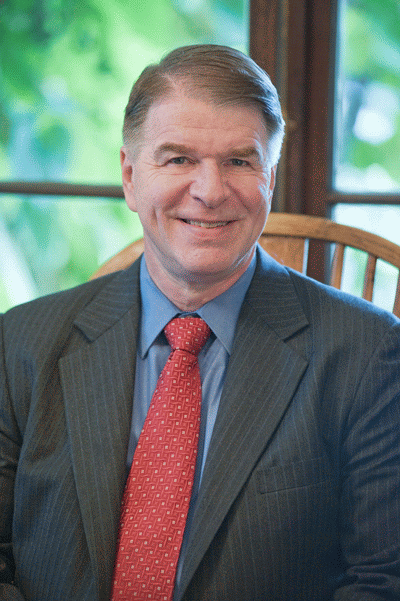 Daniel Mark Fogel, served as the 25th President of the University of Vermont for nine years, beginning on July 1, 2002. During his tenure the University expanded significantly, with a 40% enrollment increase, while bringing in the academically strongest and most diverse student body in institutional history. At the same time, research productivity grew by 80%, the University’s endowment nearly doubled, and the campus was physically transformed with new land acquisitions and a major building program. Before coming to UVM, he was Executive Vice Chancellor and Provost at Louisiana State University. A productive literary scholar and poet, Fogel holds a tenured professorship in English at UVM (and is Professor Emeritus at LSU). He was the founding editor of The Henry James Review and a co-founder of the Henry James Society. He has produced seven books (four authored, three edited, including one of the Henry James volumes in the Library of America) and numerous scholarly articles. He has served as President of the New England Association of Colleges and Schools and as chair of the Board of the Association of Public and Land Grant Universities. He is the co-editor, with Elizabeth Malson-Huddle, of Precipice or Crossroads? Where America’s Great Public Universities Stand and Where They Are Going Midway through Their Second Century (SUNY Press, 2012), which was supported by a National Endowment for the Humanities grant that is also providing support for the Precipice of Crossroads Symposium.
Daniel Mark Fogel, served as the 25th President of the University of Vermont for nine years, beginning on July 1, 2002. During his tenure the University expanded significantly, with a 40% enrollment increase, while bringing in the academically strongest and most diverse student body in institutional history. At the same time, research productivity grew by 80%, the University’s endowment nearly doubled, and the campus was physically transformed with new land acquisitions and a major building program. Before coming to UVM, he was Executive Vice Chancellor and Provost at Louisiana State University. A productive literary scholar and poet, Fogel holds a tenured professorship in English at UVM (and is Professor Emeritus at LSU). He was the founding editor of The Henry James Review and a co-founder of the Henry James Society. He has produced seven books (four authored, three edited, including one of the Henry James volumes in the Library of America) and numerous scholarly articles. He has served as President of the New England Association of Colleges and Schools and as chair of the Board of the Association of Public and Land Grant Universities. He is the co-editor, with Elizabeth Malson-Huddle, of Precipice or Crossroads? Where America’s Great Public Universities Stand and Where They Are Going Midway through Their Second Century (SUNY Press, 2012), which was supported by a National Endowment for the Humanities grant that is also providing support for the Precipice of Crossroads Symposium.